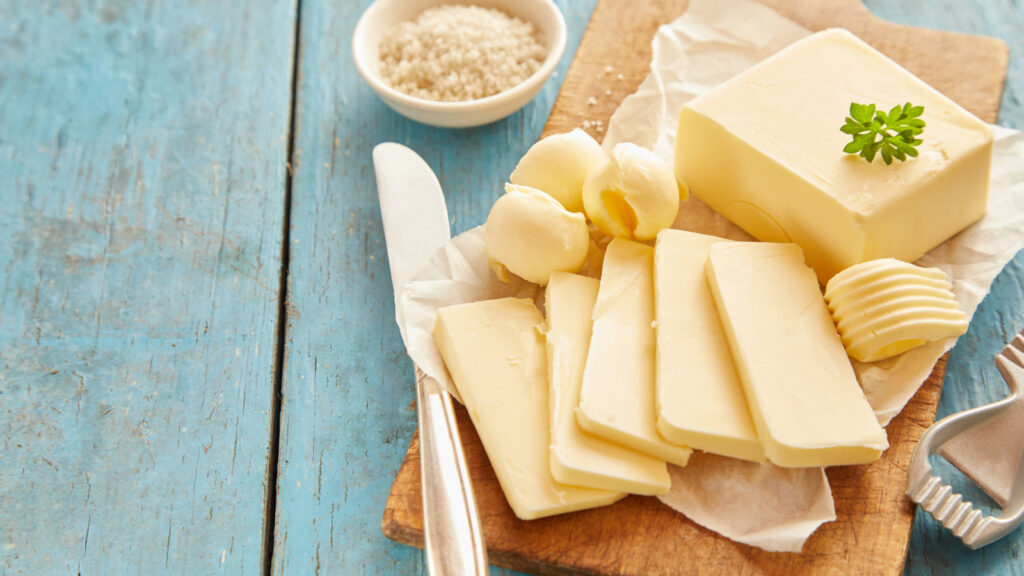Butter is a popular and versatile ingredient used in cooking and baking. It adds richness, flavor, and texture to a wide variety of dishes. While butter is often enjoyed for its taste, it’s important to understand its nutrition facts and health benefits. In this comprehensive guide, we will explore the nutritional composition of butter and delve into the potential health benefits it can offer.
Nutrition Facts of Butter:
- Butter is primarily composed of milk fat and contains trace amounts of protein and carbohydrates. The nutritional profile of butter can vary slightly depending on the source and processing methods, but here is a general overview of its key components:
- Fat: Butter is a concentrated source of fat, with approximately 80% of its composition being fat. The main type of fat in butter is saturated fat, which accounts for about 50% of the total fat content. Saturated fats have long been considered unhealthy due to their association with increased risk of heart disease. However, recent research has challenged this notion, suggesting that not all saturated fats are equal in terms of their effects on health.
- Cholesterol: Butter is a significant source of dietary cholesterol, with about 30 milligrams per tablespoon. Dietary cholesterol was once believed to have a direct impact on blood cholesterol levels, but newer studies have shown that saturated fat intake has a more significant influence on cholesterol levels than dietary cholesterol itself.
- Vitamins: Butter contains small amounts of fat-soluble vitamins, such as vitamin A, vitamin E, and vitamin K2. These vitamins play important roles in various bodily functions, including vision, immune function, and blood clotting.
- Minerals: Butter contains trace amounts of minerals like calcium, phosphorus, and selenium. While the quantities are not substantial, they contribute to the overall mineral intake from the diet.
Health Benefits of Butter:
- Nutrient Absorption: The presence of fat in butter aids in the absorption of fat-soluble vitamins (A, E, K) present in other foods. Including a moderate amount of butter in meals can help ensure the efficient utilization of these essential vitamins by the body.
- Satiety and Weight Management: The high-fat content in butter can contribute to a feeling of fullness and satisfaction after a meal. This can potentially help with portion control and reduce overall calorie intake, promoting weight management.
- Vitamin A: Butter is an excellent source of vitamin A, which is essential for maintaining healthy vision, supporting immune function, and promoting skin health. Vitamin A also plays a crucial role in the growth and development of bones and teeth.
- Conjugated Linoleic Acid (CLA): Butter from grass-fed cows is a natural source of conjugated linoleic acid (CLA). Research suggests that CLA may have anti-inflammatory properties, help reduce body fat, and provide potential benefits for heart health.
- Vitamin K2: Butter from grass-fed cows is also a good source of vitamin K2, which plays a crucial role in bone health and may help prevent cardiovascular disease. Vitamin K2 helps regulate calcium metabolism, ensuring that calcium is deposited in the bones rather than in the arteries.
- Fatty Acids: While butter is high in saturated fat, it also contains small amounts of other fatty acids, such as monounsaturated and short-chain fatty acids. These fatty acids have been associated with various health benefits, including improved blood lipid profiles and reduced inflammation.
Moderation and Considerations:
- Despite the potential health benefits of butter, it’s important to consume it in moderation due to its high fat content. Excessive intake of saturated fat can still contribute to an increased risk of heart disease, especially when combined with a diet high in refined carbohydrates and low in fruits and vegetables.
- When choosing butter, opt for organic or grass-fed varieties whenever possible. Grass-fed butter is generally considered superior in terms of nutritional quality, as it contains higher levels of beneficial fatty acids, vitamins, and antioxidants.
- Additionally, individuals with specific dietary considerations, such as those with lactose intolerance or dairy allergies, should avoid or seek alternatives to butter. Clarified butter (ghee) is a popular alternative that contains mainly pure fat and is free of lactose and casein, making it suitable for those with dairy sensitivities.
Conclusion:
Butter, with its rich taste and versatility, can be a part of a balanced and varied diet. While it is high in fat and should be consumed in moderation, it offers potential health benefits, including aiding in nutrient absorption, providing essential vitamins, and offering beneficial fatty acids. As with any food, it’s important to consider individual dietary needs and preferences when incorporating butter into meals.

